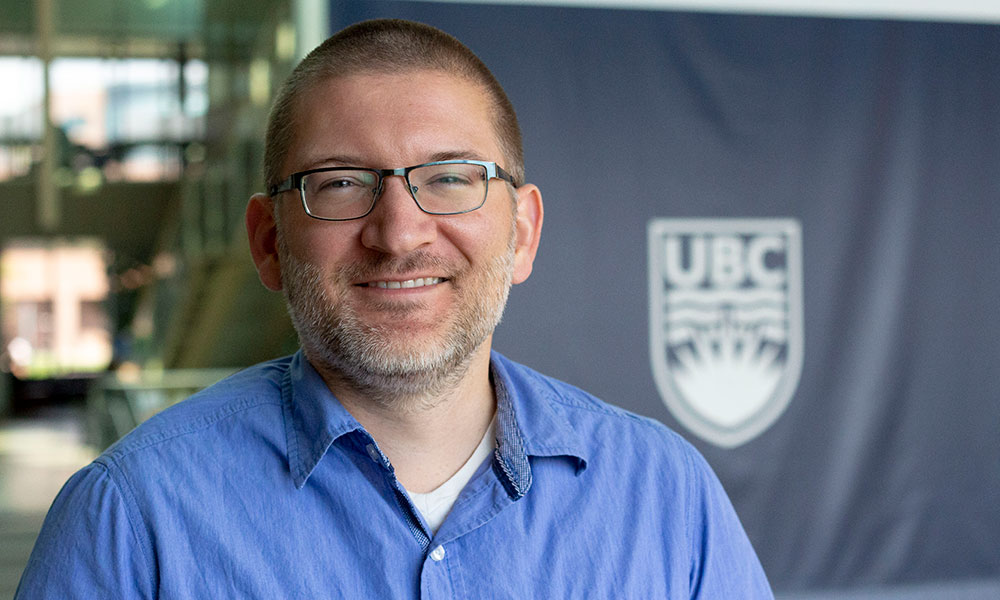Faculty Profile, People
Connecting and Engaging
December 11, 2020

About
Name
Ian Foulds
Role
Associate Professor
Program
School of Engineering
Faculty
Applied Science
Campus
Okanagan (Kelowna, BC)
Education
Postdoctoral Fellowship, Simon Fraser University
Postdoctoral Fellowship, University of Victoria
PhD, Electrical Engineering, Simon Fraser University
Master of Applied Science, Electrical Engineering, Simon Fraser University
Bachelor of Applied Science, Electrical Engineering, Simon Fraser University
Hometown
Salmon Arm, BC
“[Reconciliation] isn’t the sort of process that happens overnight, it takes time, and real compassion from all involved. I’m privileged to serve and play a small role in this change.”
THE IDEA OF INDIGENIZING THE ENGINEERING PROFESSION and curriculum is a popular theme on university campuses across North America, but for Associate Professor Ian Foulds, the concept is personal. Foulds, a UBC Okanagan Principal’s Research Chair (Tier 1) in Indigenous Reconciliation in Engineering, is passionate about teaching students how to engage and consult with Indigenous communities in engineering contexts.
Find out more about Engineering
As an engineer and member of the Métis Nation British Columbia, Foulds understands the importance of connecting engineers and aspiring engineers with Indigenous peoples and culture.
“The Truth and Reconciliation Commission had a set of key calls to action for how professionals should be trained, and although engineers are not specifically mentioned, we see these calls as equally applying to our profession. Engineers interface with and directly impact Indigenous communities through infrastructure and economic development projects. So, building student capacity for intercultural understanding, empathy and mutual respect is critical for our profession to contribute to reconciliation.”
In his role as a Principal’s Research Chair, Foulds is developing a framework to prepare engineers for engagement with Indigenous communities. This includes developing models and best practices for incorporating Indigenous knowledge and perspectives into engineering curriculums, promoting engineering to Indigenous students and establishing a multi-institution hub within BC for Indigenous reconciliation in engineering.
Combining all these initiatives is no small feat, but Foulds sees the importance of this cultural shift.
“These changes won’t happen overnight, but I’m proud of our progress to date,” says Foulds. “UBCO and the School of Engineering have been pushing forward in the area of Indigenizing engineering education and we’ve seen gains, but we have really only begun.”
TWO PASSIONS IN ENGINEERING
As an electrical engineering researcher, Foulds uncovers innovations within the field of microfabrication related to micro-electromechanical systems (MEMS) and microfluidics. He leads the Electromechanical Microsystems & Polymer Integration Research (EMPIRe) Group, which develops MEMS, microfluidic systems and the techniques to build them.
The group’s goal is to shrink sensors and eventually conduct chemical and biological analysis in a miniaturized format. These ‘labs-on-a-chip’ can produce results with greater sensitivity, more accuracy and better information. EMPIRe is also working on projects like massive parallelization for chemical/pharmaceutical production, biomarker detection and implantable drug delivery.
The recipient of a Governor General’s Gold Medal for outstanding academic achievement in his doctoral program, Foulds has also completed a Natural Sciences and Engineering Research Council postdoctoral fellowship at the University of Victoria working on a cell arraying device. Prior to joining UBCO, he was a founding faculty member in electrical engineering at King Abdullah University of Science and Technology in Saudi Arabia, a graduate-only research university on the shores of the Red Sea.
In 2018, Foulds and Assistant Professor of Teaching Jannik Eikenaar received a UBC Okanagan Aspire Learning and Teaching initiative award to support curriculum change, innovate teaching practices and make learning environment enhancements through Indigenous-focused modules, as envisioned by the campus’ strategic plan.
As a result, Foulds has been leading an initiative at the School of Engineering to meticulously review its curriculum to identify areas where it can indigenize content and delivery. This includes presenting ‘Indigenous minutes’ at faculty council meetings to help faculty members learn material they were never taught themselves — an approach everyone has embraced.
After several years of development, the school is also launching an online intercultural communication module-based program that addresses issues of diversity, empathy and racism. The program tracks participants and provides badges to those who successfully complete the course.
“This isn’t the sort of process that happens overnight; it takes time and real compassion from all involved. I’m privileged to serve and play a small role in this change,” Foulds says.